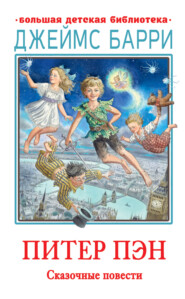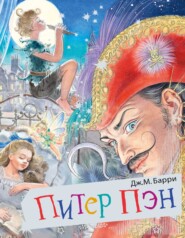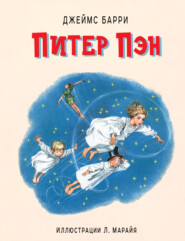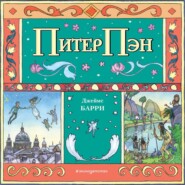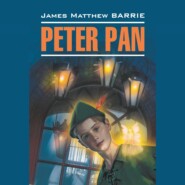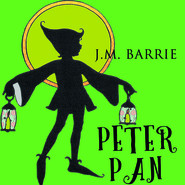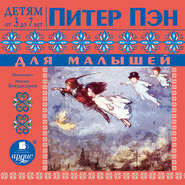По всем вопросам обращайтесь на: info@litportal.ru
(©) 2003-2025.
✖
The Little Minister
Настройки чтения
Размер шрифта
Высота строк
Поля
“Gie her a name, I say,” the precentor ordered, “or, as chief elder of this kirk, supported by mair than half o’ the Session, I command you to lift your hat and go.”
Hendry gave an appealing look to Tosh and Spens, but the precentor’s solemnity had cowed them.
“They say, then,” he answered sullenly, “that it’s the Egyptian. Yes, and I believe they ken.”
The two farmers drew back from this statement incredulously; but Tammas Whamond jumped at the kirk officer’s throat, and some who were in the church that night say they heard Hendry scream. Then the precentor’s fingers relaxed their grip, and he tottered into the middle of the room.
“Hendry,” he pleaded, holding out his arms pathetically, “tak’ back these words. Oh, man, have pity, and tak’ them back!”
But Hendry would not, and then Lang Tammas’s mouth worked convulsively, and he sobbed, crying, “Nobody kent it, but mair than mortal son, O God, I did love the lad!”
So seldom in a lifetime had any one seen into this man’s heart that Spens said, amazed:
“Tammas, Tammas Whamond, it’s no like you to break down.”
The rusty door of Whamond’s heart swung to.
“Who broke down?” he asked fiercely. “Let no member of this Session dare to break down till his work be done.”
“What work?” Tosh said uneasily. “We canna interfere.”
“I would rather resign,” Spens said, but shook when Whamond hurled these words at him:
“‘And Jesus said unto him, No man, having put his hand to the plough and looking back, is fit for the kingdom of God.’”
“It mayna be true,” Hendry said eagerly.
“We’ll soon see.”
“He would gie her up,” said Tosh.
“Peter Tosh,” answered Whamond sternly, “I call upon you to dismiss the congregation.”
“Should we no rather haud the meeting oursel’s?”
“We have other work afore us,” replied the precentor.
“But what can I say?” Tosh asked nervously. “Should I offer up a prayer?”
“I warn you all,” broke in Hendry, “that though the congregation is sitting there quietly, they’ll be tigers for the meaning o’ this as soon as they’re in the street.”
“Let no ontruth be telled them,” said the precentor. “Peter Tosh, do your duty. John Spens, remain wi’ me.”
The church emptied silently, but a buzz of excitement arose outside. Many persons tried to enter the vestry, but were ordered away, and when Tosh joined his fellow-elders the people were collecting in animated groups in the square, or scattering through the wynds for news.
“And now,” said the precentor, “I call upon the three o’ you to come wi’ me. Hendry Munn, you gang first.”
“I maun bide ahint,” Hendry said, with a sudden fear, “to lock up the kirk.”
“I’ll lock up the kirk,” Whamond answered harshly.
“You maun gie me the keys, though,” entreated the kirk officer.
“I’ll take care o’ the keys,” said Whamond.
“I maun hae them,” Hendry said, “to open the kirk on Sabbath.”
The precentor locked the doors, and buttoned up the keys in his trousers pockets.
“Wha kens,” he said, in a voice of steel, “that the kirk’ll be open next Sabbath?”
“Hae some mercy on him, Tammas,” Spens implored. “He’s no twa-and-twenty.”
“Wha kens,” continued the precentor, “but that the next time this kirk is opened will be to preach it toom?”
“What road do we tak’?”
“The road to the hill, whaur he was seen last.”
Chapter Thirty-One.
VARIOUS BODIES CONVERGING ON THE HILL
It would be coming on for a quarter-past nine, and a misty night, when I reached the school-house, and I was so weary of mind and body that I sat down without taking off my bonnet. I had left the door open, and I remember listlessly watching the wind making a target of my candle, but never taking a sufficiently big breath to do more than frighten it. From this lethargy I was roused by the sound of wheels.
In the daytime our glen road leads to many parts, but in the night only to the doctor’s. Then the gallop of a horse makes farmers start up in bed and cry, “Who’s ill?” I went to my door and listened to the trap coming swiftly down the lonely glen, but I could not see it, for there was a trailing scarf of mist between the school-house and the road. Presently I heard the swish of the wheels in water, and so learned that they were crossing the ford to come to me. I had been unstrung by the events of the evening, and fear at once pressed thick upon me that this might be a sequel to them, as indeed it was.
While still out of sight the trap stopped, and I heard some one jump from it. Then came this conversation, as distinct as though it had been spoken into my ear:
“Can you see the school-house now, McKenzie?”
“I am groping for it, Rintoul. The mist seems to have made off with the path.”
“Where are you, McKenzie? I have lost sight of you.”
It was but a ribbon of mist, and as these words were spoken McKenzie broke through it. I saw him, though to him I was only a stone at my door.
“I have found the house, Rintoul,” he shouted, “and there is a light in it, so that the fellow has doubtless returned.”
“Then wait a moment for me.”
“Stay where you are, Rintoul, I entreat you, and leave him to me. He may recognize you.”
“No, no, McKenzie, I am sure he never saw me before. I insist on accompanying you.”
“Your excitement, Rintoul, will betray you. Let me go alone. I can question him without rousing his suspicions. Remember, she is only a gypsy to him.”
“He will learn nothing from me. I am quite calm now.”
Hendry gave an appealing look to Tosh and Spens, but the precentor’s solemnity had cowed them.
“They say, then,” he answered sullenly, “that it’s the Egyptian. Yes, and I believe they ken.”
The two farmers drew back from this statement incredulously; but Tammas Whamond jumped at the kirk officer’s throat, and some who were in the church that night say they heard Hendry scream. Then the precentor’s fingers relaxed their grip, and he tottered into the middle of the room.
“Hendry,” he pleaded, holding out his arms pathetically, “tak’ back these words. Oh, man, have pity, and tak’ them back!”
But Hendry would not, and then Lang Tammas’s mouth worked convulsively, and he sobbed, crying, “Nobody kent it, but mair than mortal son, O God, I did love the lad!”
So seldom in a lifetime had any one seen into this man’s heart that Spens said, amazed:
“Tammas, Tammas Whamond, it’s no like you to break down.”
The rusty door of Whamond’s heart swung to.
“Who broke down?” he asked fiercely. “Let no member of this Session dare to break down till his work be done.”
“What work?” Tosh said uneasily. “We canna interfere.”
“I would rather resign,” Spens said, but shook when Whamond hurled these words at him:
“‘And Jesus said unto him, No man, having put his hand to the plough and looking back, is fit for the kingdom of God.’”
“It mayna be true,” Hendry said eagerly.
“We’ll soon see.”
“He would gie her up,” said Tosh.
“Peter Tosh,” answered Whamond sternly, “I call upon you to dismiss the congregation.”
“Should we no rather haud the meeting oursel’s?”
“We have other work afore us,” replied the precentor.
“But what can I say?” Tosh asked nervously. “Should I offer up a prayer?”
“I warn you all,” broke in Hendry, “that though the congregation is sitting there quietly, they’ll be tigers for the meaning o’ this as soon as they’re in the street.”
“Let no ontruth be telled them,” said the precentor. “Peter Tosh, do your duty. John Spens, remain wi’ me.”
The church emptied silently, but a buzz of excitement arose outside. Many persons tried to enter the vestry, but were ordered away, and when Tosh joined his fellow-elders the people were collecting in animated groups in the square, or scattering through the wynds for news.
“And now,” said the precentor, “I call upon the three o’ you to come wi’ me. Hendry Munn, you gang first.”
“I maun bide ahint,” Hendry said, with a sudden fear, “to lock up the kirk.”
“I’ll lock up the kirk,” Whamond answered harshly.
“You maun gie me the keys, though,” entreated the kirk officer.
“I’ll take care o’ the keys,” said Whamond.
“I maun hae them,” Hendry said, “to open the kirk on Sabbath.”
The precentor locked the doors, and buttoned up the keys in his trousers pockets.
“Wha kens,” he said, in a voice of steel, “that the kirk’ll be open next Sabbath?”
“Hae some mercy on him, Tammas,” Spens implored. “He’s no twa-and-twenty.”
“Wha kens,” continued the precentor, “but that the next time this kirk is opened will be to preach it toom?”
“What road do we tak’?”
“The road to the hill, whaur he was seen last.”
Chapter Thirty-One.
VARIOUS BODIES CONVERGING ON THE HILL
It would be coming on for a quarter-past nine, and a misty night, when I reached the school-house, and I was so weary of mind and body that I sat down without taking off my bonnet. I had left the door open, and I remember listlessly watching the wind making a target of my candle, but never taking a sufficiently big breath to do more than frighten it. From this lethargy I was roused by the sound of wheels.
In the daytime our glen road leads to many parts, but in the night only to the doctor’s. Then the gallop of a horse makes farmers start up in bed and cry, “Who’s ill?” I went to my door and listened to the trap coming swiftly down the lonely glen, but I could not see it, for there was a trailing scarf of mist between the school-house and the road. Presently I heard the swish of the wheels in water, and so learned that they were crossing the ford to come to me. I had been unstrung by the events of the evening, and fear at once pressed thick upon me that this might be a sequel to them, as indeed it was.
While still out of sight the trap stopped, and I heard some one jump from it. Then came this conversation, as distinct as though it had been spoken into my ear:
“Can you see the school-house now, McKenzie?”
“I am groping for it, Rintoul. The mist seems to have made off with the path.”
“Where are you, McKenzie? I have lost sight of you.”
It was but a ribbon of mist, and as these words were spoken McKenzie broke through it. I saw him, though to him I was only a stone at my door.
“I have found the house, Rintoul,” he shouted, “and there is a light in it, so that the fellow has doubtless returned.”
“Then wait a moment for me.”
“Stay where you are, Rintoul, I entreat you, and leave him to me. He may recognize you.”
“No, no, McKenzie, I am sure he never saw me before. I insist on accompanying you.”
“Your excitement, Rintoul, will betray you. Let me go alone. I can question him without rousing his suspicions. Remember, she is only a gypsy to him.”
“He will learn nothing from me. I am quite calm now.”









